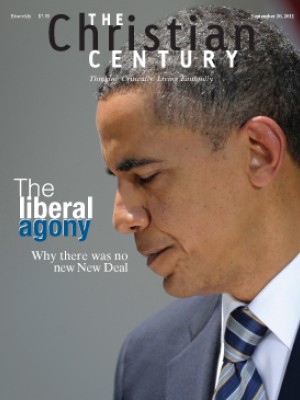Sunday, September 25, 2011: Exodus 17:1-7; Philippians 2:1-13; Matthew 21:23-32
A man once bought himself a cemetery plot and a lawn chair, and then took a week of vacation to sit on the chair at his plot. I don't think he sat there because the view was pleasant or because he was proud of his new property. He did it because he wanted to see his life from the point of view of his death and his death from the point of view of his life. Ignatian spiritual directors do something similar when they invite Christians to imagine thinking backward from their dying moment to a decision or choice that they're about to make: If you were looking back from the end of your life, would that decision or choice be from God?
Mortality is a gift of God that helps us look to all our forebears in the faith as exemplars of discipleship; the moment of our dying prompts us to consider how often ethical decisions are made in faithfulness but without certitude. As we anticipate that final moment, we consider our deepest values, our surest beliefs and our ultimate hope. That hope leads us to live with integrity as far as we are able, and to finish our days with reliance upon God's mercy for everything.
Read our latest issue or browse back issues.
A few months ago I stopped at Author's Ridge, a graveyard in Concord, Massachusetts, where several literary and philosophical leaders of the 19th century are buried. At the gravesite of Ralph Waldo Emerson, probably the best-known and most widely read philosopher of his day, is an immense boulder of white quartz with a bronze plaque stating his name and his words: "passive Master in the hands of the Over-Soul." To me both the stone and the quote seem outsized.
A few yards farther on I found the headstone of Emerson's friend Henry David Thoreau, who found his calling at Walden Pond with the message: "Simplify, simplify." A white stone the size of a large brick marks his grave; the inscription reads "Henry." There is humility in the headstone. There is a willingness to be remembered quietly and informally by posterity and all eternity. The stone does not name dates, years or accomplishments. It has the humility of humus, of earth with the breath of God removed. I think that Thoreau came closer to the truth of life and human mortality than Emerson because he told a simpler story and rests under a lighter stone. I hope that may be true for you and for me. "Blessed are the poor in spirit for theirs is the kingdom of heaven."
Two more headstones in the cemetery mark the graves of a doctor and of a pastor. The doctor (or his family) put up a reddish headstone that was the size of a small billboard, and the inscription is a recitation of his professional accomplishments and the organizations he served. It's more like a job application or a résumé than a memorial. If an anthropologist stopped by in 500 years, I wondered, what would this stone tell him or her about this man? What did he most value? To what did he bow down? Was it to achievement, career, success, prestige and position? In terms of Paul's letter to the Philippians, there was no "self-emptying" here, no kenosis of ambition or achievement.
The pastor's headstone, in contrast, is simple, small and bears an inscription based on Micah 6:8: "Do justice, love kindness, and walk humbly with your God." Here is the humility of the surrendered human being, one of the saints. Sometimes a preacher drones on in a sermon, but this preacher said the essential thing. It is sermon enough and will not wear out if repeated from time to time through the millennia.
I found two groups of people buried in that cemetery: those who based their hope on their own achievements and virtues in order to preserve their reputations and those who based their hope on God's grace in order to preserve their souls. In 1 Thessalonians, Paul tells some of the early Christians, "I would not have you grieve as others do who have no hope." Rather, he said, minister as those who do have a hope, a hope based on a belief "that Jesus died and rose again . . . through Jesus, God will bring with him those who have died."
If we live, serve, pray, grieve and die as people who wear our reputations and achievements like billboards trying to persuade the world of how fine and how virtuous we are, or to convince God of how much we deserve salvation, then we are without hope. If instead we exist as those whose final way of living and dying is a message of faith, hope and love in Christ, then we are getting close to the heart of things.
When I was 17, an instructor asked me to imagine what the epitaph of my headstone would be. It was a startling assignment—at 17 I thought I was immortal. What would yours be? Would it be news about you, how great you were, how far you traveled? Or would the news be about God? I chose verses from Philippians 1: "For me, living is Christ and dying is gain. . . . Only, live your life in a manner worthy of the gospel of Christ." I have failed and blundered and contradicted that news in 10,000 ways since then, but I have never forgotten that it is the message on my headstone. It urges me to do justice, to love kindness and to walk humbly. It is my only hope.






